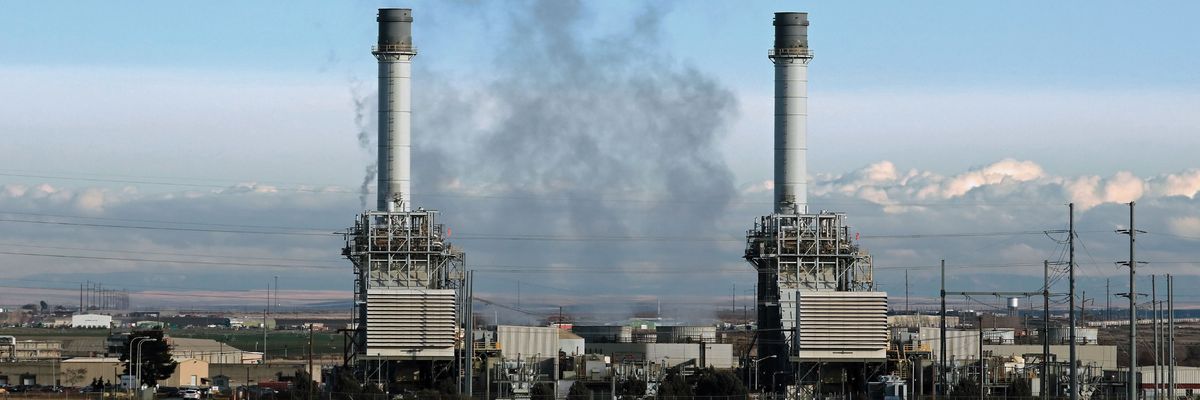The youth-led Sunrise Movement on Friday panned the Biden administration's decision to delay a regulatory crackdown on existing gas-fired power plants by exempting the major polluters from a forthcoming rule aimed at curbing planet-warming greenhouse gas emissions.
E&E News, which first reported the Environmental Protection Agency's (EPA) move, noted that the delay "could push a major part of the president's fight against global warming until after the November election."
"Under the new approach, EPA is still expected to complete a rule in April that would cut greenhouse gas pollution limits for existing coal-fired and future natural gas plants," E&E News reported. "But the rule coming out in April will no longer include limits for existing gas-fired plants—the country's top generator of electricity."
EPA Administrator Michael Regan said in a statement that splitting the rules would allow the agency to take "a new, comprehensive approach to cover the entire fleet of natural gas-fired turbines, as well as cover more pollutants including climate, toxic, and criteria air pollution."
But that rationale didn't satisfy some climate advocates. The Sunrise Movement said it was "disappointed" in the decision and accused the administration of "caving to pressure" from industry lobbyists.
"Biden is on thin ice with young people," Sunrise added. "He can't throw a bone to us on Monday, let us down on Tuesday, and expect our generation to turn out in the numbers he needs us to in order to win."
"Don't get us wrong, we applaud the EPA for finalizing the rules regulating harmful local pollutants from these power plants," the group added. "These rules are a huge win for environmental justice and will protect frontline communities from toxic air pollution. But, we need more from Biden."
"EPA promises that some future proposed rule will address these emissions, but time is not on our side, and the agency's generally lethargic rulemaking pace does not leave one optimistic."
Sen. Sheldon Whitehouse (D-R.I.), chair of the Senate Budget Committee and a member of the chamber's Environment and Public Works Committee, also slammed the decision to—at least temporarily—exempt gas-fired plants from tougher regulations.
"EPA's new power plant rule omits a massive emissions source: existing gas power plants. Making a rule that applies only to coal, which is dying out on its own, and to new gas power plants that are not yet built, is not how we are going to reach climate safety," said Whitehouse. "Failing to cover the plants responsible for the vast majority of future carbon pollution from the power sector makes no sense."
"It is inexplicable that EPA, knowing of these emissions, did not focus this rulemaking on existing gas-fired plants from its inception," the senator continued. "EPA promises that some future proposed rule will address these emissions, but time is not on our side, and the agency's generally lethargic rulemaking pace does not leave one optimistic. With temperature records being broken daily and a spiraling cascade of climate-driven extreme weather events affecting families across America and the world, the planet cannot afford action at EPA's pace. The agency must complete a robust rule covering the existing gas fleet by the end of this year."
The EPA's original proposal to strengthen pollution standards for new and existing power plants drew criticism from environmentalists who said it would cover just a small percentage of existing gas plants and rely far too heavily on ineffective carbon capture technology. The utility industry, meanwhile, lobbied aggressively against the proposal.
Abigail Dillen, president of Earthjustice, defended the EPA's new approach, arguing that its decision to separately pursue more ambitious regulations for existing gas-fired plants would allow the agency "to consider technologies that were not considered in its initial proposal and ensure that new standards do not shift pollution to dirty, uncontrolled plants and the communities they pollute."
But Sunrise warned Friday that putting off any new rules targeting existing gas plants could leave the fate of any broader regulatory effort "up to the results of the 2024 election."
"That's not how a climate president acts," the group said.
Donald Trump, the former president and presumptive 2024 GOP nominee, aggressively rolled back environmental regulations during his first four years in office and appears poised to do the same—potentially on an even larger scale—if he wins in November.
"Trump and his advisers have made campaign promises to toss crucial environmental regulations and boost the planet-heating fossil fuel sector," The Guardianreported last month. "Those plans include systemically dismantling the Environmental Protection Agency."
